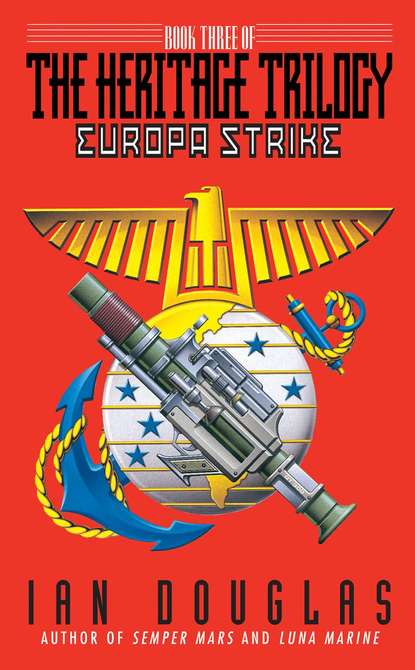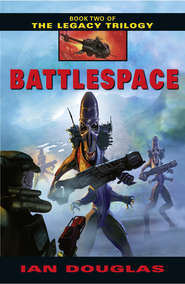По всем вопросам обращайтесь на: info@litportal.ru
(©) 2003-2025.
✖
Europa Strike
Настройки чтения
Размер шрифта
Высота строк
Поля
He dragged his gaze down from the sky and fixed it on Kaminski’s back. Together, they trudged across the landing deck. The rest of the company was filing along a path leading toward the building at the edge of The Pit; someone in a suit identical to Jeff’s save for bright blue identifying bands on upper arms and legs stood at the edge of the deck, waving them on.
“Major Warhurst?” a man’s voice asked.
He raised his own gloved hand to show who was speaking. “I’m Warhurst, sir. Bravo Company, and XO of the Expeditionary Force.”
“Dr. Shigeru Ishiwara. Konichiwa! Welcome to Cadmus Station!”
“Good to be here, sir.” If it was a lie, it was a well-intentioned one.
“Let’s get you and all of your men below,” Ishiwara said. “You’re not wearing your long-term pliss units.”
Each suit had a PLSS, a Personal Life Support System built into the back, housing most of the suit’s power generating and heating systems, as well as reserves of air and water. The crowding aboard the bug had necessitated using PLSS Type Ones, which provided two to three hours of life support, depending on the amount of exertion. Ishiwara was wearing a Type Three, so bulky it looked like it was wearing him, a molded white box with irregular angles grasping him from behind. With that unit, he could survive on the Europan surface for as much as twenty-four hours, assuming he didn’t pick up too many rems in the process and fry.
“Our life support is fine,” Jeff replied. “It’ll be nice to get out of the wind, though.”
“Meaning the plasma of Jupiter’s magnetosphere,” Ishiwara said, laughing. “I understand. If you’ll follow me?”
Steps led down of the edge of the landing deck, taking them to a well-worn path through the ice bordered by a slender handrail. Here and there he could see what looked like puddles of clear meltwater on the ice, and, when he looked closely, it seemed to him that some of the puddles were fizzing slightly around the edges of the pools, as ice continued to melt.
“Please watch your step, gentlemen,” Ishiwara warned, pointing to one of the puddles. “Those pools can be very slick. The bombardment of protons from Jupiter’s magnetosphere is constantly breaking down the surface ice and forming new compounds, especially hydrogen peroxide. The pools then dissociate into oxygen and hydrogen, which escape—but the melting process leaves things slippery.”
“We’ve been briefed,” Jeff replied. Even so, his first few steps along the path were a bit unsteady, and on the fifth step he felt his heavy right boot slide forward alarmingly. Reaching out, he grasped the handrail beside the path. There was no sense in proving he was some kind of macho Marine who didn’t need handrails, not when the alternative was an undignified fall on his ass. Up ahead, he saw several Marines helping a comrade to his feet; yeah, they were learning about dignity the hard way.
Ahead, several space-suited men were carrying large crates toward one of a number of sheds dotting the crater floor. “You store equipment on the surface?” Jeff asked.
“Some,” Ishiwara replied. “Especially the things that explode, like seismic penetrators. We use them to send shock waves through the ice to determine its thickness, and also, sometimes, to cut holes. We’d rather not have those going off inside the E-DARES facility.
“Those sheds, though,” he added, indicating the Quonset hut storage structures, “are for the honey buckets.”
“Shit.”
“Exactly. Europa has its own biosystem, and we must avoid contaminating it at all costs. Similar restrictions are used in our explorations of Antarctica, you know. Human wastes are dehydrated, sealed inside plastic bags, then allowed to freeze solid on the surface. After a year here, we’ve accumulated quite a bit of the stuff—nearly ten tons. We’ll need to take it with us when we leave.”
“That ship’ll have the damnedest cargo manifest I’ve ever heard of. But wouldn’t the cold and radiation sterilize the stuff?”
Вы ознакомились с фрагментом книги.
Приобретайте полный текст книги у нашего партнера:
Приобретайте полный текст книги у нашего партнера:











